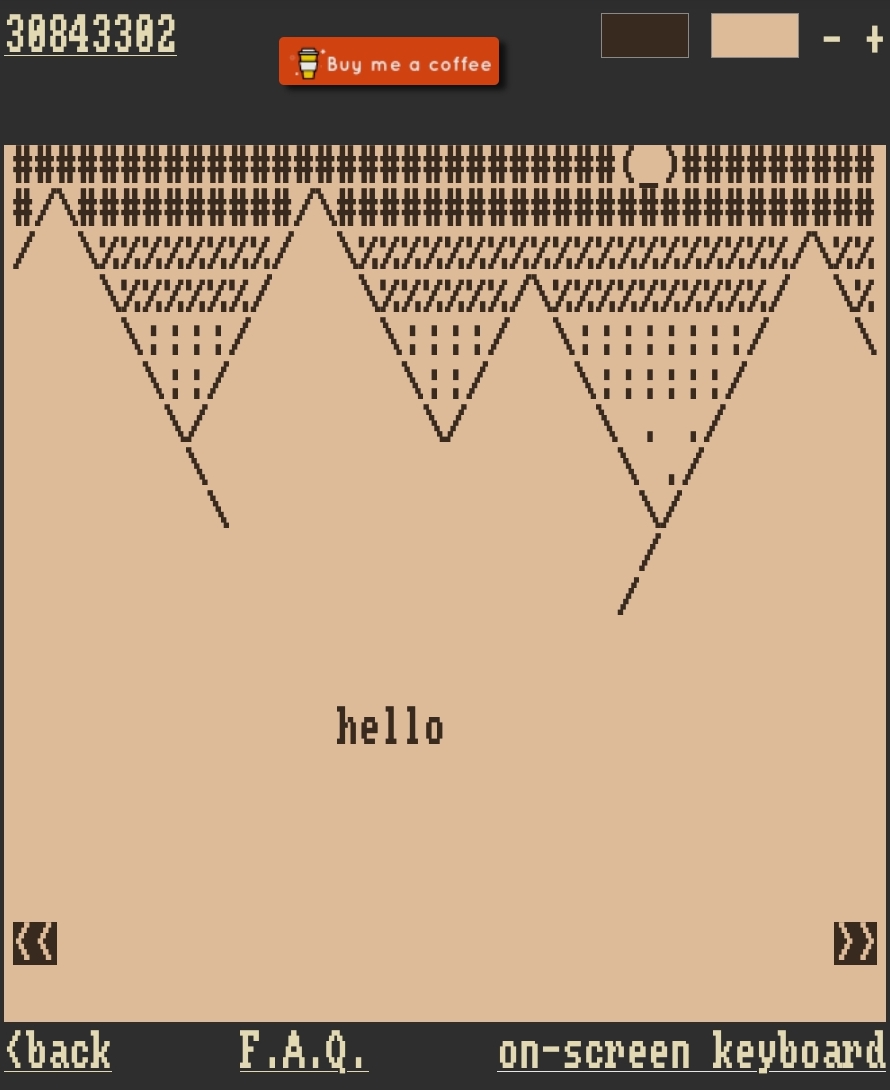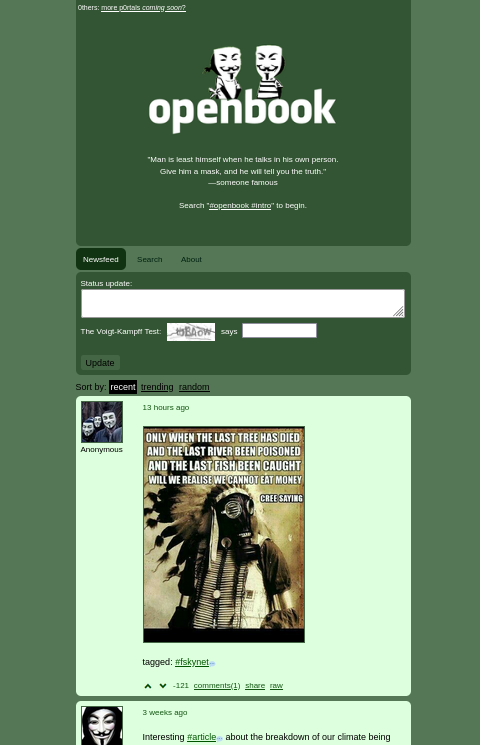Games
infinite
This is a text-based adventure game which is created by everyone who plays it!
Like any text-based adventure, you can look around and travel between "rooms". But instead of a complicated system of commands, verbs and objects, predetermined events and triggers, it's just a purely open-ended user-created sandbox world.
To read or re-read a room description, just press Enter. This is the default behavior when nothing has been typed in. If you wish to look at, or travel to, anything in the room description, just type it in! That's it. There is no distinction between "looking" and "traveling", so you'll always have to type "back" if you want to go back. Or to go forward, just type anything from that room description!
Press enter to read or re-read the "room description". Link: theconstruct
ASCII with us
Before images on the Internet, there was ASCII Art! ASCII was an early standardized character encoding, and ASCII Art meant using the characters of the different letters to create pictures from the text!
ASCIIwith.us is a fun way to create ASCII Art in a public place where other people can see it and add to it! It also creates an endless world of ASCII Art because any character can be converted into a link - a door to another screen - by just hitting ENTER. The possibilities are truly endless!

The website also refreshes LIVE! (although not very fast) so you can see someone else typing if they are on the same screen as you! You can invite your friends to the same screen, and draw a picture together, or play a game like tic-tac-toe or boxes together!
Philosophy
The corporate Internet creates the illusion that everyone must depend on their centralized infrastructure to function. But that's only because we store such vast quantities of data, pictures, music, and video, these are the main things taking up so much storage on their servers. That, and the vast processing power it takes to run their A.I. algorithms that are working full-time to figure out how to keep us addicted to their platforms. These things are all wasteful and counter-productive overhead costs. This ASCIIwith.us website was made as an example of how we can still have the vast expanse of an endless digital frontier that operates on smaller websites outside the grasp of corporate social media giants, if only we can find simpler formats that require less processing and less storage! Such as this simple text-based format that allows anyone to contribute to a vast landscape of text (and images made of text) without needing very high CPU power. Using this format, we can create an endless world, unlimited, complete with hidden gems, and together create worlds within worlds together!
Space Game
This is a space exploration game where you fly around a bunch of planets. When you land on a planet, each planet will request that you deliver something to a planet you've already been to. But the planets aren't labeled, so you have to remember the descriptions of each planet as you explore this alien solar system. It basically amounts to a memory game.
Each planet will ask you only one task, and you can turn them down if you want. The planets will only ask you to deliver something to a planet you've already been on. And nothing will ever tell you if you've visited all the planets or finished all the tasks. It's not a very goal-oriented game.
Anti-Social Media
Openbook
Openbook is a faceless facebook made to allow a social media type of experience without any individual identities. The website is sorted by hashtags, and allows any user to add tags to previous posts to help each other organize information. There are no usernames or individual identities, so everyone can speak their mind as Anonymous.
The format of Openbook allows for a steady stream of posts, a shared newsfeed that appears the same for every user, and the ability to upvote and downvote posts, as well as the ability to share posts. The posts can be upvoted or downvoted any number of times, so the score on a post doesn't really mean anything. But the frequency with which a post is brought to "everyone's" attention is up to anyone, because if anyone clicks "share" on any post, it pops up on the top again. It's a democratic way to give everyone a voice by allowing anyone the chance to say anything and come up on the top, however briefly, and giving everyone else the ability to "boost" any other post to the top at any time by "sharing" it.

Philosophy
The philosophy behind Openbook was to experiment with the shape of online communication to benefit from innovations such as hashtags while avoiding the typical traps of social media. For one thing, with no usernames or individual identities the Openbook platform encourages focusing on and considering the message while disregarding the question of who is the messenger. This helps give everyone an equal voice, regardless of who they are.
Unlike anonymous websites like 4chan, Openbook is meant to collect and organize information using hashtags. It also has a timelessness to it, because whenever a post is "shared" it appears as if it was just posted, so posts don't necessarily get old. This format of communication becomes a cooperative effort to consolidate and organize information for each other.
Another experimental innovation is how hashtags are used. Since there are no users, the "@" is free to be used for something other than usernames. On the internet there is a problem of "context collapse", and when it comes to hashtags this happens simply because there is no way to refer to a hashtag with a reference that doesn't also tag your own "tweet" with that hashtag. So on Openbook you can refer to a hashtag using "@" instead of "#" when you want to link to a hashtag without tagging your own post as part of that hashtag. This gives the ability for more layered and complex linking and organization.
333focus
333focus shows images in a format similar to instagram, but all the AI-powered algorithms are replaced by people-powered suggestions, and users can choose how much or how little they want to see from another user's galleries. It's the unique geometry of 333focus that allows users to so easily decide how much or how little they are willing to get sucked in.
Imagine you have a bookshelf with your favorite photos. Some are front and center, catching everyone's eye, while others are arranged behind them, waiting to be discovered. That's exactly how 333focus works – it's your digital shelf, organized in a way that lets visitors choose how deep they want to dive into your collection.
For anyone browsing the website, they can choose between three different levels of immersion to decide how much or how little they want to get sucked in by any user's page. These are represented by the different colors in the logo. There is a one by one square, a two by two square, and a three by three square. You will see at the top-right there are buttons corresponding with each view. This tells you what view you're in.
Art
Web Comic:
lunchbaghead
A webcomic to explore the issues we face with surveillance, automation, artificial intelligence, social media, newsfeed algorithms, and targeted advertising. It's a unique style pixel-art comic with animated panels.
The comic seeks to develop a solid understanding of the invisible technological forces we're being confronted with, as well as provide a narrative to understand how we could resist the worst of what is to come.
This comic comes highly recommended for "future-proofing your mind".
Podcast:
lunchbaghead
A well-documented explanation of how to transition from the capitalist economy to the gift economy. This podcast explores one method in particular, a peer-to-peer resource distribution network that revolves around the concept of "fractal generosity".
Watch lunchbaghead explore what can be done without money, and how to prevent all your efforts from becoming recuperated by the capitalist system. A distribution system that honors the principle of fractal generosity is being built that involves the distribution of resources without allowing resources to fall back into the hands of anyone who will monetize those resources. We keep value circulating within our own communities.
Utilities
MindTags
MindTags is a general organization tool using hashtags that's made to minimize button presses and keep track of which context you're operating in. It's specifically made to facilitate the #distributionNetwork as described below, but it can be used for anything.
You can easily share a selection of notes using mindtags. Exporting notes only exports those notes which match your current search criteria, so you can search a certain hashtag or whatever it is you want to share with someone, and then just export those notes for them to import into their mindtags.
